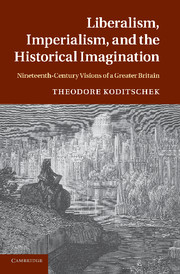 Liberalism, Imperialism, and the Historical Imagination
Liberalism, Imperialism, and the Historical Imagination Book contents
- Frontmatter
- Contents
- Acknowledgements
- List of abbreviations
- Introduction
- 1 Imagining Great Britain: Union, Empire, and the burden of history, 1800–1830
- 2 Imagining a British India: history and the reconstruction of Empire
- 3 Imagining a Greater Britain: the Macaulays and the liberal romance of Empire
- 4 Re-imagining a Greater Britain: J. A. Froude: counter-romance and controversy
- 5 Greater Britain and the “lesser breeds”: liberalism, race, and evolutionary history
- 6 Indian liberals and Greater Britain: the search for union through history
- Epilogue: From liberal imperialism to Conservative Unionism: losing the thread of progress in history
- Index
- References
3 - Imagining a Greater Britain: the Macaulays and the liberal romance of Empire
Published online by Cambridge University Press: 04 April 2011
- Frontmatter
- Contents
- Acknowledgements
- List of abbreviations
- Introduction
- 1 Imagining Great Britain: Union, Empire, and the burden of history, 1800–1830
- 2 Imagining a British India: history and the reconstruction of Empire
- 3 Imagining a Greater Britain: the Macaulays and the liberal romance of Empire
- 4 Re-imagining a Greater Britain: J. A. Froude: counter-romance and controversy
- 5 Greater Britain and the “lesser breeds”: liberalism, race, and evolutionary history
- 6 Indian liberals and Greater Britain: the search for union through history
- Epilogue: From liberal imperialism to Conservative Unionism: losing the thread of progress in history
- Index
- References
Summary
In England we can have no other feeling than that of respect for men who stood up in bad times to maintain the independence of their country against unjust aggression … No greater calamity could have befallen England than if, for want of such men [William Wallace and Robert Bruce] she had been able to place on Scotland the yoke she abhorred, and to have her, even down to this time perhaps, a conquered nation … I say it would have been a happy thing for the British Empire if Ireland had her Wallace and her Bruce, if it had not in those dark ages come by conquest under the arbitrary yoke of England, but had like Scotland gradually amalgamated with England by pacific measures.
T. B. Macaulay, toast to Calcutta Scottish Society, Dec. 1, 1834, quoted in S. C. Sanial, “Macaulay in Lower Bengal,” Calcutta Review, 244 (1906), 306We are trying … to give a good government to a people to whom we cannot give a free government … We have to engraft on despotism those blessings which are the natural fruits of liberty … It may be that the public mind of India may expand under our system till it has outgrown that system; that by good government we may educate our subjects into a capacity for better government: that having been instructed in European knowledge, they may in some future age, demand European institutions. Whether such a day will ever come I know not. […]
- Type
- Chapter
- Information
- Liberalism, Imperialism, and the Historical ImaginationNineteenth-Century Visions of a Greater Britain, pp. 99 - 150Publisher: Cambridge University PressPrint publication year: 2011


